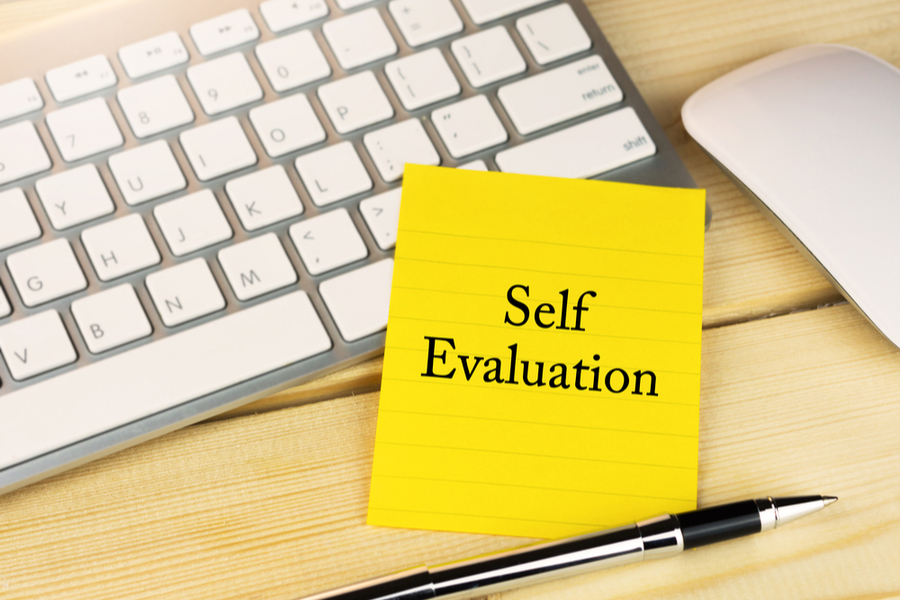Years ago, when teaching Fundamentals of Nursing, one of the basic practices we introduced to our students was that of self-evaluation. This concept was a foreign one to some students and a difficult one for most. Coupled with the skills objective outlines each student received for the various steps of their training, we also encouraged them to journal about their clinical experiences—to keep an honest personal record of their progress. We knew as instructors that it was important for us to clarify expectations and to guide them in their learning; but hugely important, as well, was their own assessment of where they were in the process, what they felt they understood or were failing to understand, how they themselves evaluated their mastery of these vital skills. We knew that their personal charting of progress would be tremendously significant in taking ownership of their own learning. One of the most challenging things for me as an instructor, the final evaluation of the student at semester’s end, was always aided when the student had kept up an ongoing self-assessment.
Self-evaluation is important not just in nursing, but in all areas of life—particularly in our walks with the Lord. How do we most effectively participate in God’s shaping of us through His Word? How do we discern our own errors? God has given us His Word and He has clearly set out the way to live a life of flourishing. He has given us examples of those who have followed Him with all their hearts, as well as those who have rejected Him—and the outcomes of both. He did not leave us wondering what the goals are or the path to get there, but it takes a submitted heart to follow it—along with honesty, humility, and patience. I continue to learn daily as I study His Word, but I still experience the chagrin of realizing what a slow learner I am. If you, too, have experienced discouragement that your progress seems slow, take heart from Max Lucado who offers words of reassurance in How Happiness Happens. “We are all works in progress,” he pens. “He [God] isn’t finished, and some of His works—well, some of us—need extra attention. Take a cue from the apostle Paul, who told some friends, ‘There has never been the slightest doubt in my mind that the God who started this great work in you would keep at it and bring it to a flourishing finish on the very day Christ Jesus appears.’ (Philippians 1:6, The Message).”
While Philippians assures us that God will indeed bring His work in us to completion, David’s words in Psalm 19:9-13 point us to the part God’s Word plays in that process. Look at all the many benefits of a life built on Scripture which are delineated in these verses. We can trust the perfect, trustworthy Word of God, which is more precious than pure gold and sweeter than any honey on earth. Don’t miss at the end of the psalm the personal self-assessment. David realizes all too well our human need for the warnings Scripture alone can give us—and the need for a perspective outside our own.
The law of the Lord is perfect,
refreshing the soul. The statutes of the Lord are trustworthy,
making wise the simple. The precepts of the Lord are right,
giving joy to the heart. The commands of the Lord are radiant,
giving light to the eyes. The fear of the Lord is pure,
enduring forever. The decrees of the Lord are firm,
and all of them are righteous. They are more precious than gold,
than much pure gold; they are sweeter than honey,
than honey from the honeycomb.By them your servant is warned; in keeping them there is great reward.
But who can discern their own errors?
Forgive my hidden faults.
Keep your servant also from willful sins;
may they not rule over me.
Even as we read God’s Word, we cannot discern our own errors without the Holy Spirit convicting and guiding us. Michael Brown explains in The Grace Controversy, p. 68, “Conviction is a ministry of great love. Condemnation says, ‘You have sinned, Get away from me!’ Conviction says, ‘You have sinned. Come near to me.’ Satan condemns, but the Spirit convicts; that is why I am grateful to the Lord for this precious ministry of the Spirit. It is a lifesaver in every sense of the word; rather than resisting it or denying it, we should embrace it. Conviction is the love of our Father in action on our behalf.”
Jesus explains the role of the Holy Spirit in John 16:7-9, “Nevertheless, I tell you the truth. It is to your advantage that I go away; for if I do not go away, the Helper will not come to you; but if I depart, I will send Him to you. And when He has come, He will convict the world of sin, and of righteousness, and of judgment of sin” (NKJV). Motivated by the love of God, instructed by the Word of God, and guided and empowered by the Holy Spirit, we can discern our errors, confess, and turn from them.
The book of James also speaks to the importance of reading God’s Word and applying it. “Do not merely listen to the word, and so deceive yourselves. Do what it says. Anyone who listens to the word but does not do what it says is like someone who looks at his face in a mirror and, after looking at himself, goes away and immediately forgets what he looks like. But whoever looks intently into the perfect law that gives freedom, and continues in it—not forgetting what they have heard, but doing it—they will be blessed in what they do” (James 1 22-25 NIV).
Biblical instruction and honest self-evaluation before our loving God go hand-in-hand. Will you bring those two needs before Him today and ask the Great Teacher Himself to do what He promises in Psalm 19 – to refresh your heart, grow you in wisdom, increase your joy, and shine His own light more brightly as you diligently read His word and lay your heart and life before Him daily?
With my whole heart I have sought You; Oh, let me not wander from Your commandments! Your word I have hidden in my heart, that I might not sin against You! Blessed are You, O Lord! Teach me Your statutes! With my lips, I have declared All the judgments of Your mouth. I have rejoiced in the way of Your testimonies, as much as in all riches. I will meditate on Your precepts and contemplate Your ways. I will delight myself in Your statutes; I will not forget Your word. Deal bountifully with Your servant, That I may live and keep Your word. Open my eyes, that I may see wondrous things from Your law.
Psalm 119:10-18





